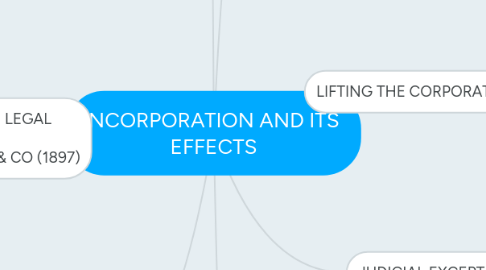
1. CERTIFICATE OF INCORPORATION
1.1. Section 16 (4) of Companies Act
1.1.1. A certificate that should be issued where the pre-registration procedures have been complied with
1.2. Section 361 of Companies Act
1.2.1. Serve as conclusive evidence that a company has been duly registered from the date mentioned in the certificate
2. PRINCIPLE OF SEPARATE LEGAL PERSONALITY SALOMON V SALOMON & CO (1897)
2.1. established the principle that a company is a separate legal person from its members/ shareholders
2.2. Once the company has been incorporated, the courts do not look behind the veil to find out why the company was formed or who really controls it
2.3. This principle is also known as the veil of incorporation
3. APPLICATIONS OF THE PRINCIPLE OF SEPARATE LEGAL PERSONALITY
3.1. The debts of a company are the responsibility of the company and not its shareholders/members
3.2. A company can own assets and the shareholders have no share (proprietary interest) in those assets
3.3. A company can enter into a contract with a shareholder
3.4. A company must sue in its own name, and not in the names of its members, for any wrong committed against it.
4. EFFECTS OF INCORPORATION
4.1. Section 16 (5) of Companies Act
4.1.1. A body corporate
4.1.2. Capable forthwith of performing all the functions of an incorporated company
4.1.3. Capable of suing and being sued
4.1.4. Having perpetual succession and a common seal
4.1.5. Has power to acquire, hold and dispose of property
5. LIFTING THE CORPORATE VEIL
5.1. Exceptions to the principle in Salomon v Salomon
5.2. The corporate veil may be lifted in certain circumstances.
5.2.1. Statutory exceptions
5.2.1.1. Provisions in Companies Act
5.2.2. Judicial exceptions
5.2.2.1. Court or judges are prepared to lift the corporate veil based on justice
6. STATUTORY EXCEPTIONS
6.1. Section 121 (2) of Companies Act
6.1.1. Signing or authorizing certain documents
6.2. Section 303 (3) and Section 304 (2)
6.2.1. Debts are contracted at the time the company has no ability of repayment
6.2.1.1. Where any officer of the company entered into a contract of a debt with no reasonable ground that the company is able for repayment, the officer will be liable for the debts
6.3. Section 304 (1) of Companies Act
6.3.1. Fraudulent trading
6.4. Section 365(2)(b) of Companies Act
6.4.1. Dividends are paid out of capital
7. JUDICIAL EXCEPTIONS
7.1. Perpetration of Fraud
7.1.1. Case: Aspatra Sdn Bhd & 21 Ors v Bank Bumiputra Malaysia Bhd & Anor (1988)
7.2. Evasion of Legal Obligation
7.2.1. Case: Gilford Motor Co. Ltd v Horne (1933)
7.3. Enemy in Times of War
7.3.1. Case: Daimler Co Ltd v Continental Tyre & Rubber Co (Great Britain) Ltd (1916)
7.4. Holding and Subsidiary Companies
7.4.1. Case: Hotel Jaya Puri Bhd v National Union of Hotel, Bar & Restaurant Workers & Anor (1980)
7.5. Tax Avoidance
7.5.1. Case: Unit Construction Co Ltd v Bullock (1960)

